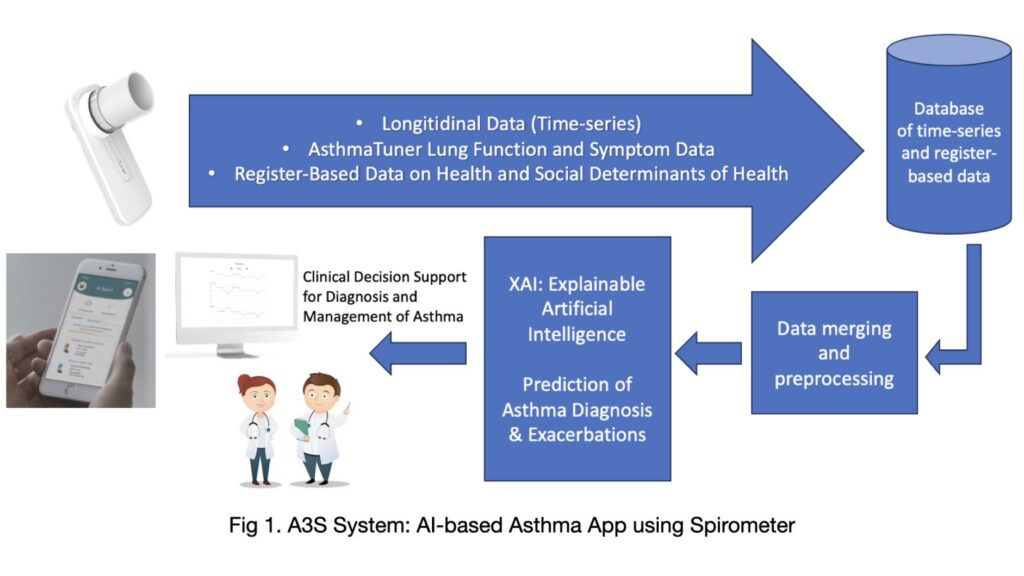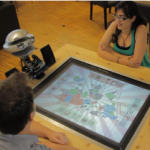About the project
Objective
AsthmaTuner is an existing remote digital tool owned by MediTuner AB in Sweden. AsthmaTuner consists of a handheld spirometer connected to a mobile app that can be used by patients with asthma and other respiratory diseases to diagnose and manage their health condition.
Explainable Artificial Intelligence (XAI) has high potential to enhance existing digital tools previously developed without AI or with black-box AI. The existing AsthmaTuner system does not use any AI so far, and naturally the scope of using black-box AI has a high potential. In this proposed project, we pursue a significant step ahead. We will explore how explainable AI (XAI) will enhance both the diagnostic and management capabilities of the AsthmaTuner system. That means, XAI will help both patient users and their health care providers further improve asthma care, with the target of reduced need for unnecessary health care visits, or costly and potentially deadly asthma attacks or exacerbations. The XAI-based digital tools are expected to prevent further health disparities and will include the addition of social determinants of health to the design, implementation, and evaluation to AsthmaTuner to improve the performance.

Background
Asthma is a large-scale health care problem, affecting around 10% of the European population, and moreover; asthma and other respiratory diseases are increasing due to environmental deterioration worldwide. Asthma is a complex problem, which is characterized by airway inflammation and respiratory symptoms of wheezing, dyspnea, chest tightness and cough that vary over time and in intensity, together with variable expiratory airflow limitation. Potentially effective ways to address asthma care are to better understand the day-to-day lung function (a longitudinal data) and asthmatic symptoms of individuals and more effectively identify, diagnose, and manage asthma by exploring potential disparities in symptoms, lung function, and outcomes that may exist by social determinants for patients. AsthmaTuner (AT) is the existing, validated digital tool in this regard.
The general purpose of the project is to design an explainable AI (XAI)-based smart AT system that uses a mobile app and a handheld spirometer. We refer to the proposed project as “A3S: AI-based Asthma App using Spirometer”. For the A3S system development, XAI algorithms will perform patient data analysis and guide decisions. The term “explainable” in XAI refers to the ability of these algorithms to provide transparent and interpretable explanations to patients and health care professionals for their predictions or decisions. The XAI algorithms will provide person-centred interventions precluding the onset or minimizing the risk of asthma in disadvantaged groups. It will help to improve respiratory health by training person-centred AI-support in asthma diagnosis and management of asthma in disadvantaged groups based on social determinants. Overall, the A3S project addresses a pressing health care problem with potentially widespread impact.
Cross-disciplinary collaboration
This is a highly collaborative project with a team of data scientists, clinicians, and AI specialists. Partners are PI Magnus Jansson, Co-PIs Saikat Chatterjee, PostDoc Zhendong Wang of EECS KTH, Ioanna Miliou of DSV SU, Docent Björn Nordlund of KUH and KI and his team, along with MediTuner AB.
About the project
Objective
- Reallocate maintenance resources from purely scheduled (preventive) activities to condition‐based and predictive strategies, thereby freeing time for future upgrades and investments.
- Identify cost drivers within the pump systems to target the layers where maintenance improvements yield the highest savings.
- Develop a predictive maintenance algorithm that incorporates a reliability index and measurable parameters to classify pump status and estimate remaining service life, assigning each pump a condition score (1 = new, 5 = worn).
- Pilot and validate the new solution at Högdalen pump station, installing and evaluating additional sensing equipment as needed.
- Ensure compatibility with Stockholm’s IoT platform, positioning the project as a first step toward broader adoption across city departments and external companies.
Background
Wastewater collection networks are essential for ensuring public health and wellbeing, yet they are susceptible to numerous faults including pipe bursts, pump malfunctions, and valve failures. Traditionally, preventing these issues has depended on frequent inspections and reactive repairs. However, there is growing recognition that a more proactive strategy—one rooted in predictive and condition-based maintenance—can both enhance the reliability of wastewater infrastructure and streamline the resources required to operate it. Such an approach can significantly reduce unexpected downtime, extend equipment lifespans, and ultimately lower overall lifecycle costs.
Despite the promise of prognostic models for predictive maintenance in many industries, water infrastructure has not received as much attention as manufacturing or other sectors. Current diagnostic tools in this domain are often tailored to a specific component or pump type, requiring specialized local measurements such as vibrations, oil temperature, or power consumption. In wastewater networks with diverse types of stations and pumps, designing a model for each component can be time-consuming. Moreover, missing measurements or uncertain behavior pose additional challenges. Consequently, the need has emerged for a flexible, data-driven solution capable of handling variations in station design, measurement availability, and environmental conditions.
The DECORUM (Optimized Predictive Maintenance for Wastewater Pump Stations) project, establishes the cooperation between the City of Stockholm, the Stockholm water utility operator (SVOA), the international water technology firm Xylem, and KTH to fill these gaps. SVOA alone operates roughly 300 wastewater pump stations, each with multiple pumps crucial to the city’s sewage system. Through a six-step development plan, SVOA has already taken steps to reduce maintenance costs while preserving high operational reliability. The next milestone is to move from largely manual, reactive procedures toward data-driven, predictive strategies that detect anomalies early, recommend targeted maintenance, and help technicians make informed decisions about when and how to service equipment.
Crossdisciplinary collaboration
The DECORUM project brings together a multidisciplinary team spanning academia, industry, and municipal stakeholders. KTH researchers contribute expertise in systems modeling, predictive algorithms, and robust control, while SVOA provides domain knowledge of large-scale wastewater operations and real-world operational data. Xylem, as a leading water technology company, offers more in-depth insights into cutting-edge pump hardware and software solutions. By uniting these diverse perspectives, the project can address both theoretical and practical challenges, ultimately delivering a flexible, scalable, and impactful predictive maintenance framework for critical urban infrastructure.
About the project
Objective
Towards the digital transformation, this research program aims to establish theory and methods for privacy-preserving localization in wireless networks. A privacy-preserving localization method is supposed to preserve user privacy while enabling communication and localization functionalities.
Background
Telecommunications providers possess vast amounts of wireless connection data that can be used for localization. Users will benefit from this location awareness, gaining access to a plethora of convenient and personalized services that will drive the digital transformation towards more intelligent, economically viable, and socially sustainable societies and industries. The scope of these services spans the gamut from industry 4.0 and home automation to comprehensive healthcare monitoring. However, it is crucial to acknowledge the potential dangers associated with such location-centric data. In the wrong hands, this information could raise privacy concerns, including data misuse, security breaches, and threats to property. In light of these risks, this research program aims to establish theory and methods for privacy-preserving localization in wireless networks.
About the Digital Futures Postdoc Fellow
Hanying Zhao is a postdoc at the Division of Information Science and Engineering at KTH. Her research interests include statistical inference, privacy-preserving technology, and localization.
Main supervisor
Tobias Oechtering, Professor, Division of Information Science and Engineering at KTH
Co-supervisor
Mats Bengtsson, Professor, Division of Information Science and Engineering at KTH
About the project
Objective
This project aims to understand better how people assess safety in a particular area of Stockholm – Järva, more specifically, how people’s safety perceptions relate to the quality of the physical and social environment of the area. We investigate the nature of safety on two fronts: an intra-area focus where we examine micro-level safety perceptions by people living and working in Järva and a city-wide focus where we explore ways to capture how people living elsewhere in Stockholm perceive Järva. The research will combine multiple sensors and data types, including phone apps, map-based surveys, and machine-learning models.
Background
Safety is a core component of people’s quality of life, affecting physical and mental health and restricting mobility and accessibility to public places. As such, safety is also a fundamental quality of the urban environment – what happens in places depends on how safe they are (or are perceived to be). Research has long pointed to the fact that indicators of poor maintenance or signs of physical deterioration are more important determinants of poor safety perceptions than actual instances of crime. The buildings’ façades, design, and the sense of ownership they promote are bound to affect crime and safety. Hence, some questions arise: which settings promote safety and for whom? What do these settings look like from a safety perspective?
Järva constitutes an interesting case study for several reasons: the area is undergoing great growth in the coming years – with more than 15,000 housing units being developed, new transportation links, workplaces and schools. However, a significantly higher share of Järva’s population feels unsafe outdoors at night and is more likely to avoid certain places where they live than the Stockholm average. In a previous study where Stockholm citizens were asked to assess Google Street View images regarding safety, the findings showed that the physical environment in Järva was ranked the lowest across Stockholm. Therefore, this project seeks to produce several diagnostics of the safety conditions in Järva and contribute to a better understanding of the spatiotemporal variations of the population’s safety perceptions.
Crossdisciplinary collaboration
Sensoring Safety Perceptions is a collaboration between research teams at KTH and MIT Senseable City Lab (part of the Stockholm Senseable Lab), as well as Stockholm City, Mapita (Maptionnaire), Kista Science City, and CityCon, and other local stakeholders based in the study area.
About the project
Objective
The vision of the proposed project is to establish a framework for dynamically optimized traffic control with a view to reduce the negative impact associated with the transport system in dense urban areas, including congestion, pollutants and noise emissions. For this purpose, the research will consist of assembling a sensor network in Stockholm collecting and processing traffic and emission data. The data will feed a set of advanced modelling tools in order to develop multilayer visualisation and simulation models.
Background
With an estimated 55% of the world’s population residing in urban environments, with projections reaching 68% by 2050, exposure to high noise levels and other environmental factors, such as air pollution, is a growing concern. In this context, the concept of smart cities has emerged to respond to the challenge of quality of living and sustainable development of these urban environments. In particular, the digitalization of society provides an opportunity to assess the exposure to these environmental stressors better to identify root causes for which targeted mitigation strategies may be specifically implemented. This may be even more so when approaching near real-time capability, opening the way for dynamic solutions.
The GEOMETRIC project seeks to contribute to this need by implementing and demonstrating recent state-of-the-art research aiming at real-time representation of traffic and associated environmental stressors in dense urban environments.
Crossdisciplinary collaboration
GEOMETRIC is a collaboration between the City of Stockholm, Kista Science City, and three research teams at KTH with expertise in Sound and Vibration, Connected transport systems, and Geoinformatics.
About the project
Objective
This project will address interactions with novel conversational systems, such as social robots and digital assistants. These technologies can assist people in societal situations such as health care, elderly care, education, public spaces and homes.



A telepresence system for human-robot interaction will be developed, allowing participants to situate themselves in natural conversations while physically in a functional magnetic resonance imaging scanner. Each participant will interact directly with a human-like robot and other human actors while lying in the scanner.
This neuroimaging experiment will allow us to understand cognitive processes underlying engagement. It will also enable an unheard-of in-depth evaluation and perception of conversational engagement as a user state.
Background
In everyday conversations, a speaker and a listener are involved in a common project that relies on close coordination, requiring each participant’s continuous attention and related engagement. At the same time, additional bystanders might show less engagement in the conversation.
Previous research in human-human and human-robot interaction has identified four types of events establishing engagement involving gesture and speech: (1) joint directed gaze at objects, (2) mutual facial gaze, (3) back-and-forth conversation, (4) short feedback such as nods while the speaker is talking. We will study the underlying neural signatures of conversational engagement.
Crossdisciplinary collaboration
The researchers in the team represent the Department of Intelligent Systems at KTH EECS, the Psychology Department and the Linguistics Department at Stockholm University.
About the project
Objective
This research project aims to design a threat modelling and attack simulation language, insuranceLang, for cyber insurance. Testing and validating the domain-specific language will be done using data from the insurance industry. Cyber insurances are fairly new, and their models are simplistic and highly generalized. One reason for this is the lack of relevant historical data on insured losses. As a consequence, cyber insurance is probably not used optimally. In particular, some industries cannot offer appropriate insurance coverage because their risks cannot be assessed.
Background
Society is getting more digitalized. This entails great opportunities but also novel cyber risks, which can be difficult to assess. An adequate understanding of cyber risk is crucial since cybersecurity is a prerequisite for successful industrial transformation and digitalization. Thus, there is great potential for overcoming some of these cyber insurance challenges. More precisely, the use of attack simulations based on system architecture (threat) models is a promising avenue for analyzing the cybersecurity posture of a system. Suppose such analyses were to become more widely used by insurers. In that case, that could enable more precise risk assessment, a better understanding of risk-reducing measures, and insights into risks that have been uninsurable until now.
Crossdisciplinary collaboration
The researchers in the team represent the School of Electrical Engineering & Computer Science, KTH and the Division of Digital Systems, RISE.
In addition to the PIs, Carlos Barreto works in this project as a postdoctoral researcher funded by Digital Futures.
